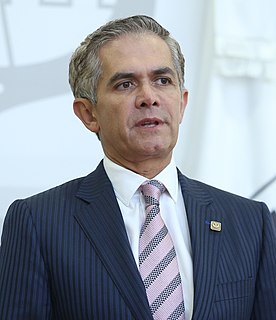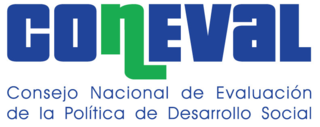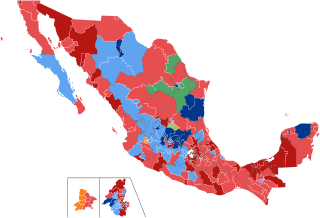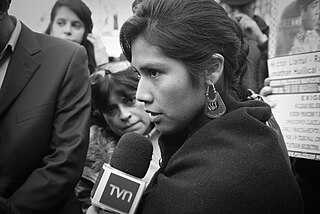
Alberto Vallarino Clément, engineer, businessman and president of Grupo VerdeAzul, S.A. since 2011.
The Mexican Space Agency is the national space agency of Mexico, established in July 2010. The agency does not have infrastructure, and aims to promote and coordinate education, research and development of the space-related activities that are performed in the country.

The Mapuche conflict generally refers to the conflict between indigenous Mapuche communities and the government of Chile, particularly in the Araucanía Region. The conflict is also present in Mapuche communities in Argentina in the territory known as Puelmapu.

Miguel Ángel Mancera Espinosa is a Mexican lawyer and politician who works with the Party of the Democratic Revolution (PRD). He served as the Mayor of Mexico City from 2012 to 2018. Mancera graduated from the Faculty of Law of the National Autonomous University of Mexico (UNAM) in 1989, and he was awarded the Gabino Barreda Medal two years later for being the best student of his class. He has a master's degree from the University of Barcelona and the Metropolitan Autonomous University and a Juris Doctor from the UNAM.
Daniel Manrique was a Mexican artist whose life and work mostly revolved around his home neighborhood of Tepito in Mexico City. He was born into a poor family, who did not support his artistic ambitions, but he maintained his Tepito identity despite. Manrique is best known for his mural work, which depicts the life and popular culture of poor urban neighborhoods such as Tepito, as well as aspects of Mexican and Latin American history since the Spanish conquest. Most of this work was done in Tepito as part of the program he founded called Tepito Arte Acá, but he also did murals in other countries such as Canada and Argentina. His work and the work of Tepito Arte Acá has been recognized by UNESCO, several universities, the Museo de Arte Moderno, CONACULTA, INBA and he was accepted into the Salón de la Plástica Mexicana.

The Mexican Red Cross is a non-governmental humanitarian assistance organization affiliated with the International Federation of Red Cross and Red Crescent Societies to help those in dangerous situations, such as natural disasters, as well as providing human health services. The organization finances its aid, assistance, and education programs through the work of thousands of volunteers and donation from individuals, institutions, organizations, associations and companies. It originated with a presidential decree in 1910 and was recognized internationally in 1912. Today it participates in national and international aid and disaster relief missions as well as various health services, training in first aid and for emergency medical technicians. Early in its history, it developed a program in nursing, which eventually became the Escuela Nacional de Enfermería y Obstetricia, today part of the National Autonomous University of Mexico.
The Pension Program for the Elderly (PPE) is a safety net, noncontributory pension program administered by the federal Ministry of Social Development (SEDESOL) in Mexico. The program aims to expand the schemes of universal social security, by providing financial support and social protection to people 65 or older who a) do not benefit from retirement or contributory pension plans or b) receive income from retirement plans or contributory pension programs that does not exceed a certain amount determined by SEDESOL.

The 2015 Venezuelan protests began in the first days of January primarily due to shortages in Venezuela, with the first massive demonstration occurring on 23 January. The series of protests originally began in February 2014 when hundreds of thousands of Venezuelans protested due to high levels of criminal violence, inflation, and chronic scarcity of basic goods because of policies created the Venezuelan government. As of January 2015, over 50 people had been arrested for protesting. The protests are listed below according to the month they had happened.

The National Council for the Evaluation of Social Development Policy is a Mexican organization coordinated by the Ministry of Social Development. As of February 10, 2014, CONEVAL has been established as an autonomous constitutional organization with legal personality, own proprietorship, technical and management autonomy.
The La Gran Cruzada is a semi-regular major professional wrestling show produced and scripted by the Mexican lucha libre promotion International Wrestling Revolution Group starting in 2011. La Gran Cruzada refers both to the overall event and to the main event tournament, a 30-man tournament to determine the number one contender for the IWRG Rey del Ring Championship.

Mexico has sought to ensure food security through its history. Yet, despite various efforts, Mexico continues to lack national food and nutrition strategies that secure food security for the people. Food security is defined as "when all people, at all times, have physical and economic access to sufficient, safe and nutritious food that meets their dietary needs and food preferences for an active and healthy life" by the World Food Summit in 1996. As a large country of more than 100 million people, planning and executing social policies are complex tasks. Although Mexico has been expanding its food and nutrition programs that have been expected, and to some degree, have contributed to increases in health and nutrition, food security, particularly as it relates to obesity and malnutrition, still remains a relevant public health problem.

Legislative elections were held in Mexico on 6 June 2021. Voters elected 500 deputies to sit in the Chamber of Deputies for the 65th Congress.
The Local Committees for Supply and Production are food distribution committees promoted by the Venezuelan government in which the communities themselves supply and distribute the priority foods through a house-to-house delivery method. It was established in 2016 by President Nicolás Maduro in response to the ongoing shortages in Venezuela. The committees have been subject of complaints about corruption, political use, delays and price increases without prior warning. This service is a subsidiary of the Ministry of Popular Power for Food.
The Mexican Cannabis Institute is a proposed agency of the Mexican federal government, under the Secretariat of the Interior, that would oversee national legalization of cannabis. Its first draft authorizing legislation, la ley para la regulación del cannabis, was shown to the public on October 17, 2019. On November 13, 2020, several Mexican Senate committees approved an act creating an agency named Instituto Mexicano para la Regulación y Control del Cannabis, or Mexican Institute for Regulation and Cannabis Control, within the Health Ministry, and on November 19, the bill enabling the agency and legalizing cannabis nationwide was passed by the Senate.

The COVID-19 pandemic in Mexico is part of the ongoing worldwide pandemic of coronavirus disease 2019 caused by severe acute respiratory syndrome coronavirus 2. The virus was confirmed to have reached Mexico in February 2020. However, the National Council of Science and Technology (CONACYT) reported two cases of COVID-19 in mid-January 2020 in the states of Nayarit and Tabasco, with one case per state.

General elections are scheduled to be held in Costa Rica on Sunday, 6 February 2022, in accordance with the Constitution of Costa Rica, to elect the president, two vice-presidents and all 57 deputies of the Legislative Assembly. If none of the presidential nominees obtained at least 40% of the votes, a second electoral round will be held on Sunday, 3 April of that same year between the two candidates who have obtained the most votes. These will be the eighteenth elections of this type held in the country since the current Constitution was put in force.

Approve Dignity is a Chilean electoral coalition officially created on January 11, 2021 by the Equality Party, Broad Front and Chile Digno in preparation for the Constitutional Convention election.

Natividad Llanquileo Pilquimán is a Mapuche lawyer and human rights activist. Llanquileo was noted for her role as a spokesperson during the 2010 Mapuche hunger strike.

Victoria Tolosa Paz is an Argentine politician and public accountant. She is the president of the National Council for the Coordination of Social Policies in Argentina.













